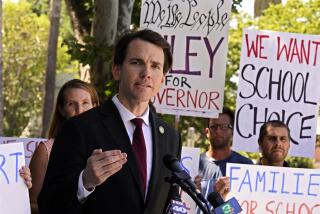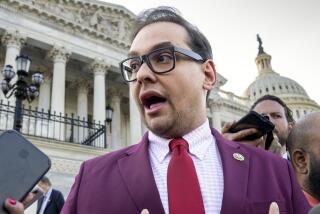Withdrawal Came Before Staff Filed Documentation for Matching Funds : Hart Campaign May Lose $800,000 in Federal Money
- Share via
WASHINGTON — Gary Hart’s precipitous withdrawal from the presidential race may cost his campaign as much as $800,000 in federal funds that might have been usable to pay off his large 1984 campaign debt, his chief election law expert said Friday.
If federal matching funds are not available, sources close to the campaign said, Hart will be left with only a small surplus from his current campaign, $1.3 million in debts from his last race and dismal prospects for more fund raising in the months to come.
Hart’s withdrawal came before his staff had filed the required documentation with the Federal Election Commission to qualify for federal matching funds for the campaign.
The matching funds are available to candidates who can demonstrate their ability to raise funds on their own and who are “actively conducting campaigns . . . in connection with seeking nomination,” according to the federal election law.
Now it may be too late to file, said Washington attorney Donald Simon, the lawyer in charge of Hart’s relations with the FEC.
“Basically we’re reviewing our options,” Simon said. “There are some fairly sizable legal issues that are unresolved,” he added, but “the fact that the campaign has ceased may cost us a fair amount of money.”
Delayed Filing Application
Some campaigns already have made their applications to the FEC, but Hart’s lawyers and accountants had decided to take time to ensure that their documents were in order and then submit them later this month.
Charles T. Manatt, the national co-chairman of Hart’s campaign, said he hoped that some way would be found to qualify retroactively for the funds, which the campaign estimated would have totaled as much as $800,000.
However, Simon said the legal requirements are so formidable for documenting a campaign’s fund-raising record that officials may now decide not to bother even trying.
“The submission is a real piece of work” costing several thousand dollars and many hours to prepare, Simon said. “We’ll decide next week” whether to try. “It’s a question of what we think our chances are.”
The six-member election commission has already received a request from Hart’s campaign to rule on whether it can legally use 1988 funds to pay off his 1984 debts.
If the FEC says it can, the matching funds that had been expected and the small surplus in the 1988 campaign coffers would have allowed Hart to wipe out most of the old obligations.
Without the matching funds, however, his prospects for paying off that debt are grim.
Fund Raising Now Difficult
Manatt conceded that Hart will have a hard time raising additional money now, particularly because of the active fund raising of the other Democratic candidates.
“Certainly some effort is going to be made” by senior Democratic officials to help Hart retire his debt, Manatt said. But “it’s much more difficult now that’s he’s gotten out. It’s not impossible, but it’s very, very difficult,” he said.
Hart also faces the possibility that people who already have pledged contributions may now change their minds. One leading Los Angeles fund-raiser already has done so.
“We made a decision that we would stop payment” on $4,000 in checks given at Hart’s most recent Hollywood fund-raiser, former Los Angeles fire commissioner and Latino activist Joe Sanchez said Friday. “He was not honest with us,” Sanchez said. “I don’t think we should be responsible for paying his old debts.”
Hart’s staff members have claimed to have raised between $1.5 million and $2 million so far this year. Little will be left over, Simon said, because although “the campaign has raised a sizable amount of money, it also has spent a lot of money.”
More to Read
Get the L.A. Times Politics newsletter
Deeply reported insights into legislation, politics and policy from Sacramento, Washington and beyond. In your inbox twice per week.
You may occasionally receive promotional content from the Los Angeles Times.










